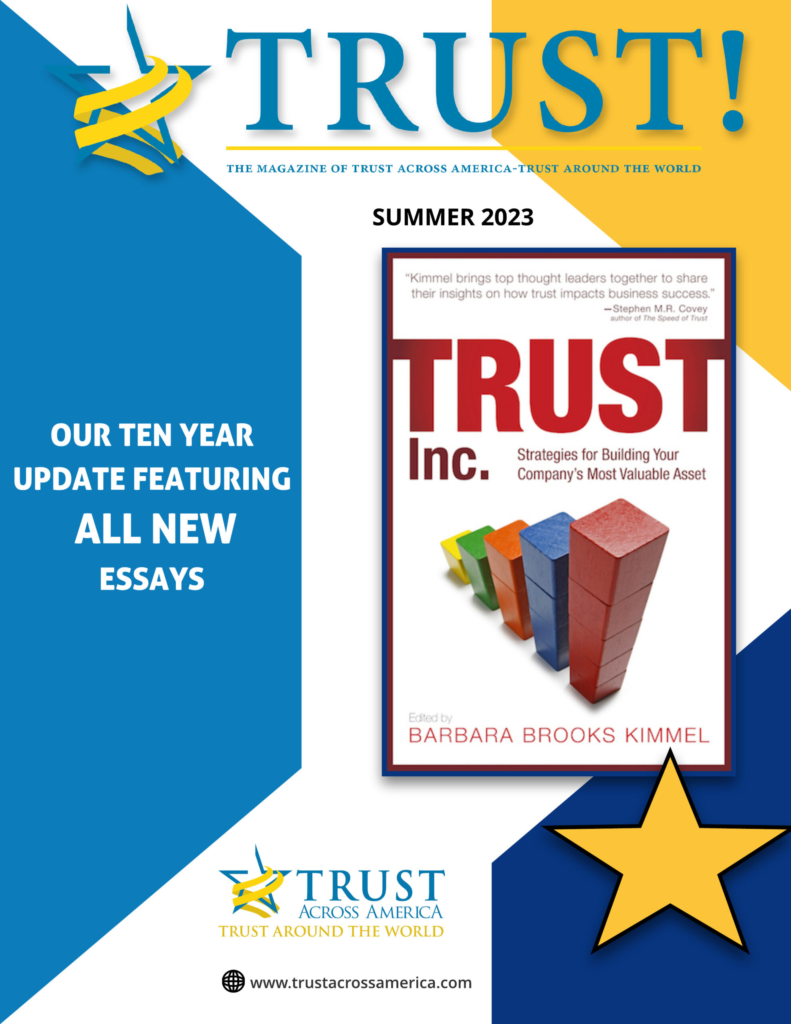
When I was asked recently how trust has changed over the past decade my first thought was that trust has been taking a pretty bad beating recently. According to most major surveys, including the annual Edelman Trust Barometer, Gallup, Pew Research Center, and others, trust has been declining. The people, groups and institutions we trust keep rearranging themselves in our collective minds, with some gaining in trust while others fade. But overall our trust in each other and our institutions has been trending downward.
But if you think about it, how we experience trust now is the same as it ever was. So is the value of trust – what it does for us – in business, politics, society, and life. As Stephen Covey has written, “Trust is the foundation for everything we do….” It is part of every relationship we have and undergirds everything we want or need to do together.
The Unchanging Experience of Trust
Our bodily experience of trust (and distrust), the sensations we feel, and the underlying neurophysiology that produce them have been with us for millennia. We are hard-wired to trust and to distrust, and we need both. Trusting others allows us to work together to accomplish what none of us can do alone. Distrust is built into our biology to help us stay alive and safe.
What we are predisposed to do when we trust or distrust someone, or a group of someones, is also pretty much the same now as when humans were living in small clans and painting stuff on cave walls.
When we trust others we feel safe enough to be open and at ease with them. At work this translates to collaborating effectively and have fun doing it. We happily share our ideas, good, bad and everything between, with people we trust. When we trust an information source we form opinions and act based on what we hear from them. When we trust a company, we tend to buy from them and invest in them. Trust naturally draws us toward who and what we trust.
Distrust, on the other hand, insists we act to protect ourselves. People, groups, companies, and institutions we don’t trust we avoid like the plague if at all possible.
In Whom We Trust (or not)
When you think “I trust this person/group/company/organization” you are making an assessment that their future behavior won’t harm and in fact will support you. That assessment leads to the embodied experience of trust described above, together with feeling certain emotions that travel with trusting, e.g., generosity, curiosity, hope, happiness, care. The same is so with the assessment “I don’t trust” except the sensations and emotions are distinctly different.
Which brings me to what has changed in the past decade and continues to change: who we trust, and to what extent we trust/distrust them. Trust has never been really high among us as a species, but according to several recent studies we are trusting less. Many parts of the foundation Covey talked about are crumbling.
For example, the Edelman Trust Barometer, an annual global survey of trust levels in business, government, NGOs, and media, has found a profound shift over the past decade in which of these institutions we place more and less trust.
Their 2023 study also reports people worldwide are becoming more polarized in general. Increasing polarization, the Edelman report shows, is both a driver and result of distrust. And the trend is not going in a positive direction.
Surveys by PwC, Pew Research Center and the Knight Foundation have looked at the trust employees and customers have in companies vs. what company leaders believe, and our trust in science and media, respectively. Again, they find changes in who we trust/distrust, with an overall downward trend over the last decade.
Couple decreasing trust with what we know about what we do when we distrust others and we have the makings of a slow-moving disaster. Unless we start turning this ship around we will see diminishing cooperation with increasing polarization, more balkanization in politics and society, less willingness to talk things out as people pull back from those they distrust.
Trust-Building as Necessary Work
I believe now more than ever it’s time for those of us who work in the field of trust-building, who have the tools and expertise, focus on helping the people we work with become competent trust-builders in their chosen fields. We understand that trust-building is a competency that can be learned, developed and practiced. We have frameworks and tools to support people as they try to build their own trust-building capability.
It is also time for leaders everywhere to step up and put learning and practicing trust-building at the forefront of their work. Doing so can reverse the downward trend of trust in the world around us.
Stronger trust between people at work (where we spend most of our time) and in our communities, and between us and the institutions that hold together the fabric of those communities, is going to be essential for us as a species to make it through the big storms looming on the near horizon: climate change, political and social upheaval, and the potential threats posed by AI.


Recent Comments